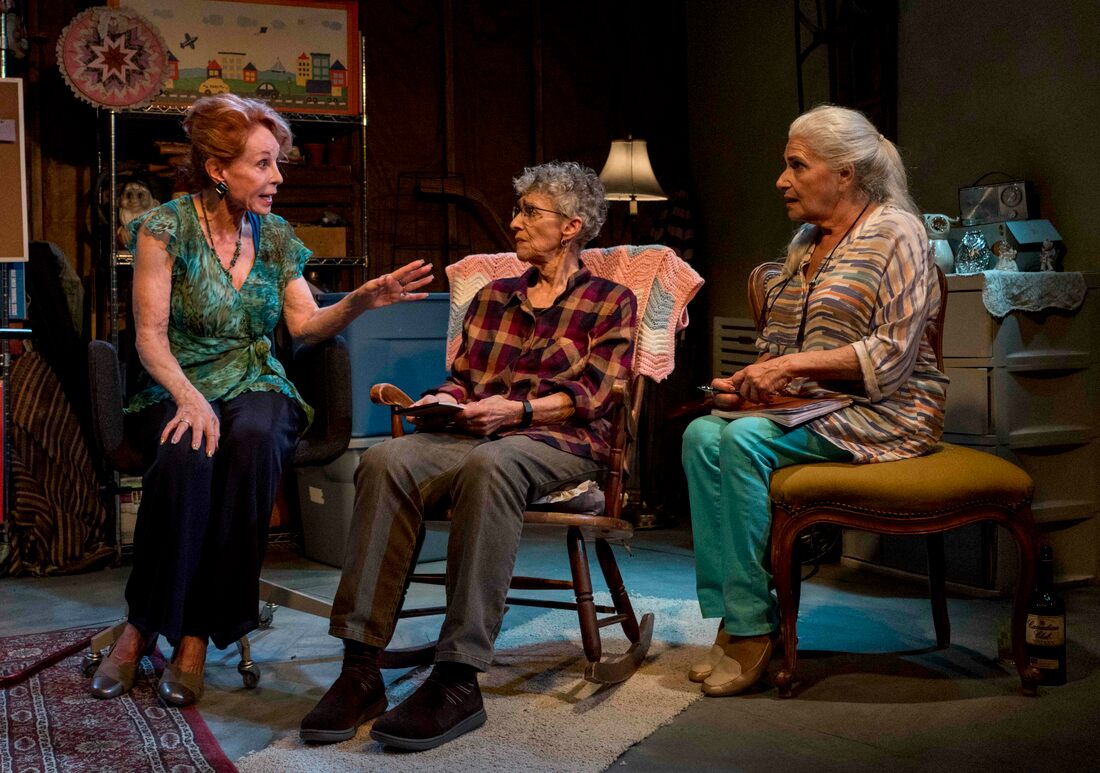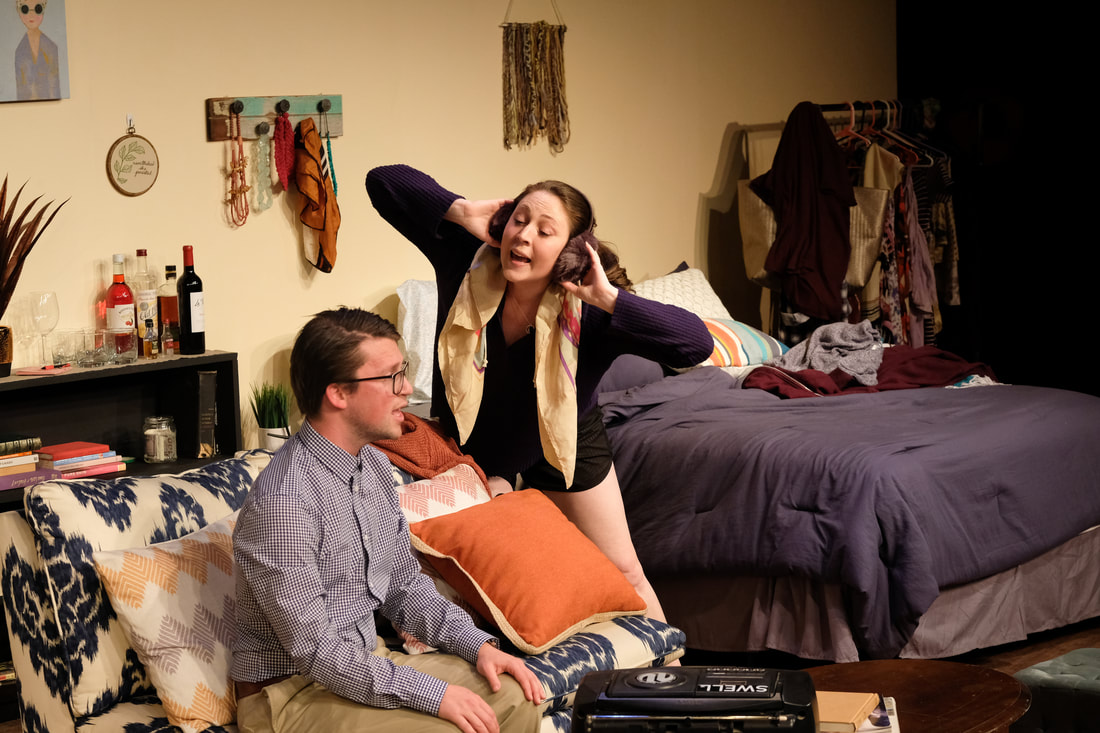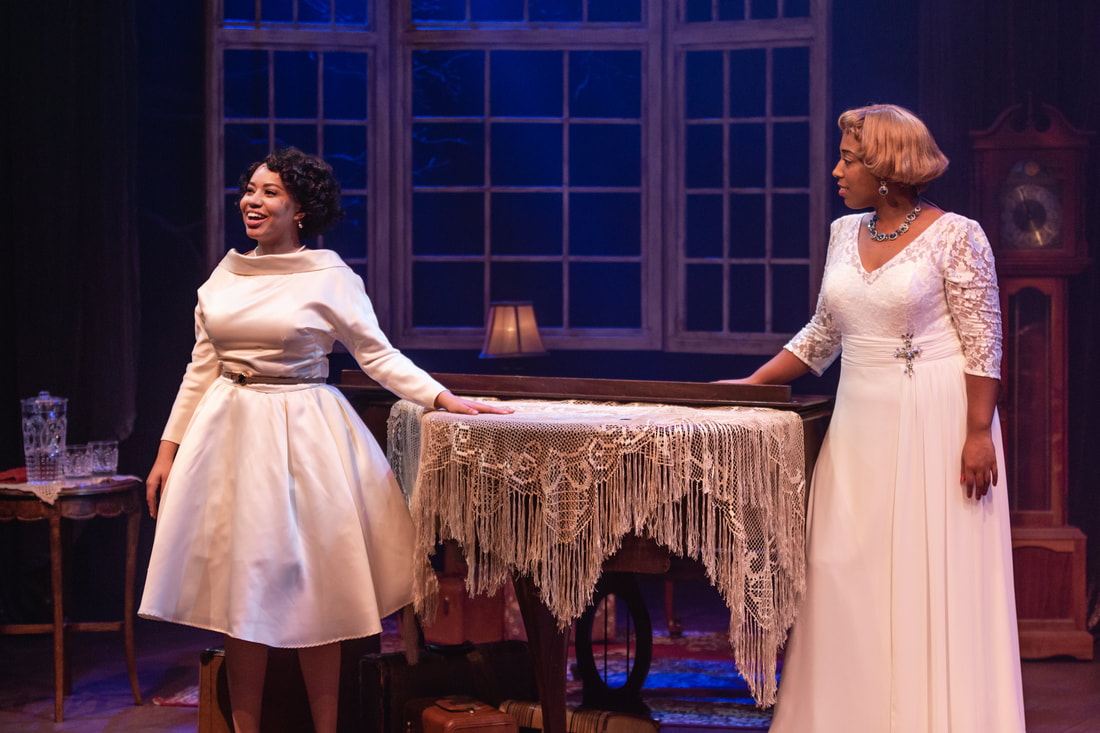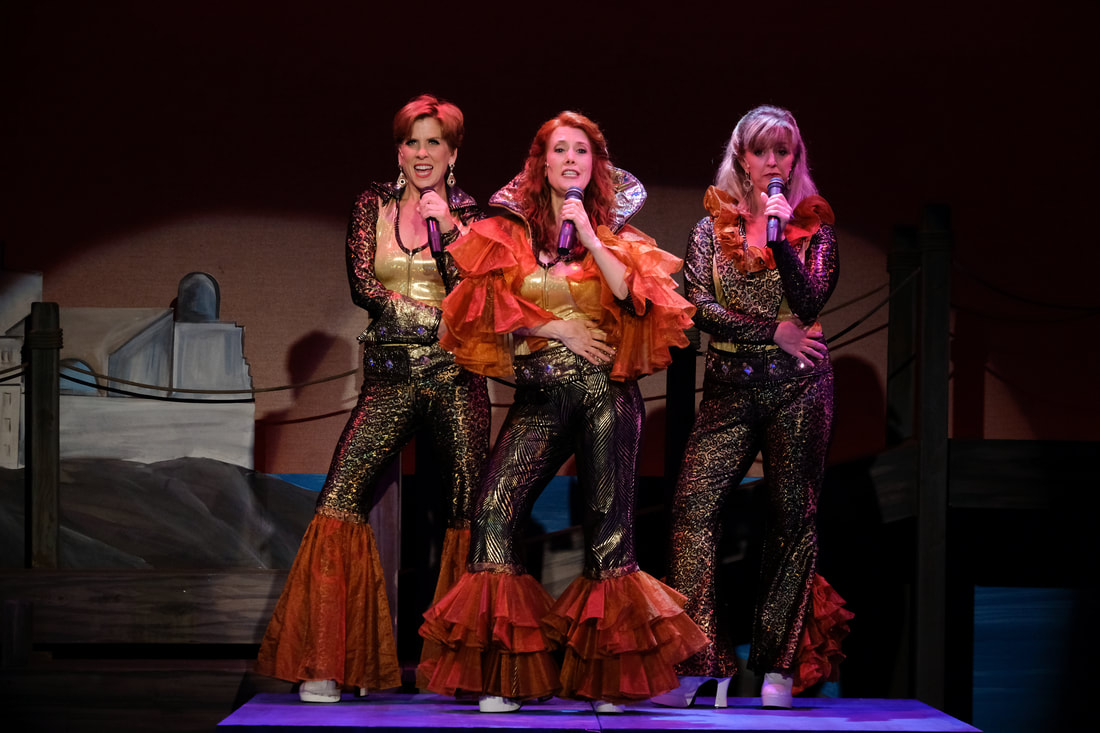|
Left to right: Jill Drexler, Loie Gail and Rhona Gold in "Herland." Photo by Daren Scott Avid readers may remember “Herland,” a 1915 novel by feminist author Charlotte Perkins Gilman about a utopian society populated and repopulated by women only. Gilman’s daring literary stroke is briefly referenced (during an intern character’s mini-lecture on utopian communities) in playwright Grace McLeod’s spirited new work Herland, though a poster of the book is pinned up on a wall, perhaps to inspire the women in her tale to heights of strength and self-reliance.
The truth is, these three women in their ‘70s – Jean (Rhona Gold), Louise (Jill Drexler) and Terry (Loie Gail) – are already possessed of strength and self-reliance. It’s the greater understanding that they come to have for each other, and for the intern (Christine Cervas Nathanson) they hire to help them create an alternative to a senior home, that unfolds along Herland’s narrative journey. It’s one accomplished, under the nimble direction of Moxie Theatre’s Jennifer Eve Thorn, with wit and charm, thanks to the performances of Gold, Gail and especially Drexler, whose oft-sardonic Louise enjoys about 80 percent of the play’s funniest comic lines. The side story involves the 18-year-old high school intern Natalie, who is coming to terms with her sexual identity. This other journey complicates an already busy script, though its struggles and revelations are related to those of Jean, Louise and Terry, each of whom in her own way mentors the young searcher. The glue that ultimately bonds them all is friendship. Hovering over the action even more than the “Herland” poster is the music of Bruce Springsteen. It is explained that Jean’s ex fronted a Boss tribute band, and she has made their garage – his rehearsal space – into the office of her new planning enterprise. Yet Springsteen seems an odd choice for the contemporary texture and messaging of this story. And a Natalie dream sequence with all the women belting out (and clad as) Bruce and his E Street Band is a little cringe-worthy. Maybe it all depends on one’s appreciation of the Springsteen look and leitmotif. Moxie is one of three theaters in the U.S. debuting Herland as part of the National New Play Network’s Rolling World Premiere program. Upcoming will be productions in L.A. and Chicago. What, no Jersey Shore? (Review originally published in San Diego CityBeat on 11/30/19.)
0 Comments
Andrew Gumm and Michelle Marie Trester in "Dancing Lessons." Photo by Ken Jacques Surviving on booze, Bugles snacks and hope against hope that she’ll ever appear on stage again following a serious leg injury, Broadway dancer Senga Quinn is in no mood when an upstairs neighbor crashes her pity party. It doesn’t help that Ever Montgomery, a literal-speaking geosciences teacher, wants her to teach him how to dance in time to survive an ordeal of his own: an upcoming awards dinner, which will be followed by dancing. Ever is willing to pay for it: $2,153 in cash for just an hour’s lesson. So how can Senga, even hobbling around with one leg in a brace, say no?
She doesn’t, and along the way in playwright Mark St. Germain’s “Dancing Lessons,” both she and Ever learn a great deal, about each other and about themselves. Scripps Ranch Theatre’s production of the 2014 play by St. Germain (“Freud’s Last Session,” “Camping with Henry and Tom”) is a charming 80-minute tale in which two gifted but self-isolated people, each low on confidence and aching with doubts, forge a friendship, then an unlikely romantic attraction and most important, an understanding. Senga (Michelle Marie Trester) has a rare allergy to anesthesia, making any surgery to repair her leg and perhaps restore her career a dangerous risk. Ever (Andrew Gumm) has Asperger’s Syndrome, a condition on the autism spectrum. For him, expression of genuine emotion and even human touch are risks of their own. To Ever, Senga is, clinically speaking, a “neurotypical.” This perception will change. The strength of St. Germain’s play is how easily its comedy springs from the divergent emotional wavelength between Senga and Ever, who come to enjoy each other and more in spite of the disconnect. At the same time, the weight of each’s circumstances is never glossed over, nor does sentimentality ever rule the day. If the narrative has a weakness it’s the late-arriving complication of Senga’s anguish over who her father is or was, presented as one reason why her personal crisis might be about more than her leg injury. No matter. At Scripps Ranch, with Meg DeBoard directing, Gumm and Trester make a credible and thoroughly engaging pair intuitive about their characters. Seen last year in broader comedy roles at not only SCT (“Baskerville: A Sherlock Holmes Mystery”) but at the Roustabouts Theatre Co. (“Romeo, Romeo & Juliet”), North Coast Rep (“Blithe Spirit”) and New Village Arts (“Miss Bennet: Christmas at Pemberley”), Trester demonstrates depth and sensitivity as Senga. The telltale scene in which she encourages the reluctant Ever to chance a handshake, then an air kiss and then a hug is a tender one, subtly played. Ultimately the lesson of this story is not about dancing at all, but about taking those chances and challenging those unknowns in the face of fear and self-doubt. As Ever tells the unseen crowd as he accepts his award: “Change equals courage.” (Review originally published in the San Diego Union-Tribune on 1/29/19.) A comedy written by Ken Ludwig (Lend Me A Tenor, Fox on the Fairway) comes with some absolute guarantees: hapless misunderstandings, slamming doors, strenuous sight gigs. So goes his 1995 play Moon Over Buffalo, currently onstage at North Coast Repertory Theatre, where Ludwig is an audience favorite. The Solana Beach company first staged this play back in 2000 and has also offered up Lend Me A Tenor and Fox on the Fairway. Like those farces, Moon Over Buffalo is pure, pratfalling, broadly acted entertainment.
Arthur Hanket and Katrina Ferguson star as dueling marrieds George and Charlotte Hay, who front a hapless repertory troupe. The story’s chief “crisis” is whether they (especially George) can keep it together long enough to impress a visiting, star-hunting Frank Capra. Two supporting members of the cast, Jacque Wilke as their daughter, and Roxane Carrasco as Charlotte’s crusty grandma, walk away with this North Coast Rep production directed by Matthew Wiener. (Review originally published in San Diego CityBeat on 1/23/19.) Amaiya Holley (left) and Noel Simone Wippler in "Marie and Rosetta." Karli Cadel Photography There’s a thin line between gospel music and rock ‘n’ roll. That’s one of two resounding statements made in George Brant’s Marie and Rosetta. The other is that the woman known as Sister Rosetta Tharpe was a veritable musical pioneer, a genre-bending artist whose vocal and guitar stylings would influence rock artists of the ‘50s, ‘60s and beyond. Brant’s one-act work, directed at Cygnet Theatre by Rob Lutfy, follows Tharpe (Noel Simone Wippler) and her young protégé, Marie Knight (Amiya Holley), in Mississippi, circa 1946, as they rehearse for the first time as a duo and learn about one another’s lives. Among other things, Rosetta teaches Marie the merits of clubbing up the church and churching up the club.
While the story behind the music is historically important, particularly where Sister Rosetta was concerned, it’s the live musical performances by Wippler (chiefly on guitar) and pianist Holley (also a wonderful singer) that fuel Marie and Rosetta. Their collaborations on tunes such as “Four Five Times” and “Strange Things” make the show’s non-musical moments drag by comparison, though Brant has crafted a clever and affecting ending. (Review originally published in San Diego CityBeat on 1/23/19.) Misty Cotton (center) has been succeeded in the role of Donna (by Natalie Nucci, not pictured) in Welk Resorts Theatre's production of "Mamma Mia!" Photo by Ken Jacques The new year marks exactly two decades since Mamma Mia!, the stage musical populated by the sugary pop songs of the Swedish group ABBA, debuted in London’s West End. The show, with a book by Catherine Johnson, would go on to mega-success, including a 14-year run on Broadway, a feature film adaptation and a sequel film that was kind of a prequel (“Mamma Mia! Here We Go Again”). Taken as complete camp, Mamma Mia! Is amusing, even hummable. Taken seriously, it’s … well, who takes it seriously?
Welk Resort Theatre does, and with good reason. Its production of Mamma Mia! Is winding up a mammoth six-month run in Escondido. In fact, it opened only a couple of months after Moonlight Stage Productions in Carlsbad presented its own Mamma Mia! This show obviously has staying power. The Welk staging enjoys a cast of 17 and a five-piece band in the pit, along with more than enough outrageousness to sustain a two-hour, 15-minute show. Ironically, the most outrageous moments come after the story ends: The three-song encore concert by Donna and the Dynamos (Natalie Nucci, Nancy Snow Carr and Barbara Schoenhofer) has the entire cavorting cast clad in what could only be described as the best AND the worst of ‘70s “couture.” Besides Nucci (the mamma of Mamma Mia!), Snow Carr and Schoenhofer, the ensemble features the versatile David S. Humphrey as one of the three men invited to the wedding of Donna’s daughter, Sophie. One, she suspects, is her natural father. (Lance Arthur Smith and Mike Bradford are likable as the other two maybe-dads. All three sing better than Pierce Brosnan from the Mamma Mia! movies. Shudder.) The real star of the Welk production, however, is young Olivia Hodson as Sophie. Not only is she an appealing actress and a nimble dancer, but also a very promising vocalist. The roll call of ABBA tunes needs no elucidation. Suffice it to say that some, like “Take a Chance on Me,” function acceptably in context with the narrative. Others, such as “Super Trouper” or even “Dancing Queen,” are there just to escort ABBA fans giddily down Memory Lane. Plenty willing to be escorted time and again are out there, ensuring that when it finally goes, Mamma Mia! won’t be gone for long. (Review originally published in San Diego CityBeat on 1/2/19.) |
AuthorDavid L. Coddon is a Southern California theater critic. Archives
July 2024
Categories |
David Coddon |
|



